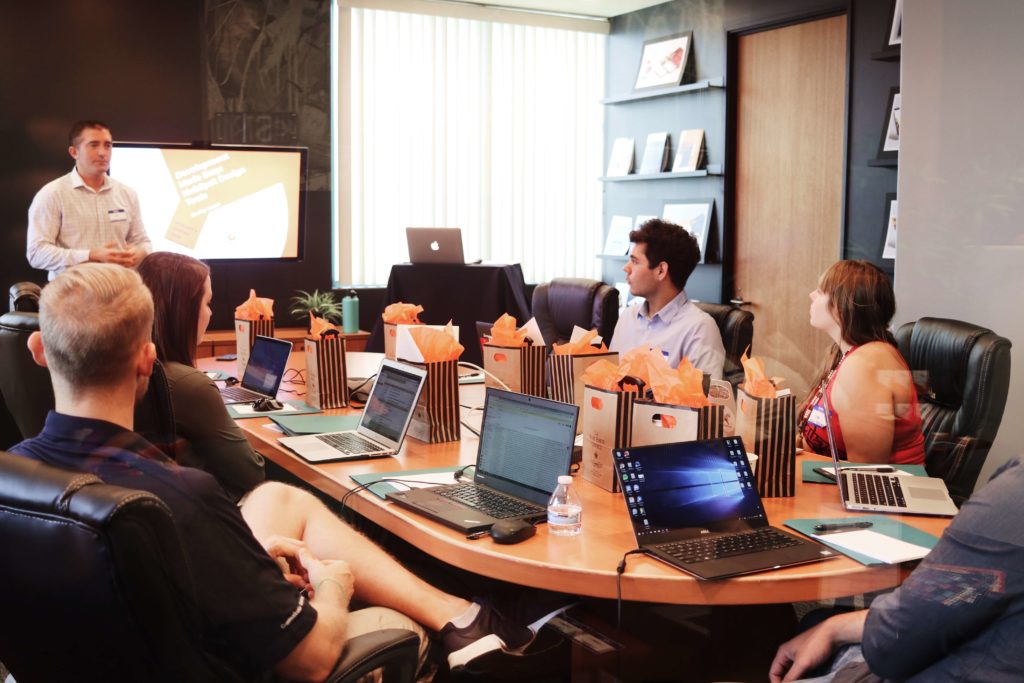
In this podcast with Nate Watson, we talk how urgent it is for organisations to start using their data for decisions.
Find the podcast on
You’ve only got a few years, so choose your data science leaders carefully, the next one is pivotal!
He says that data people are special because they’re not a single beast but a hybrid of 4 different domains, and cautions against letting a data analyst get bored, or they’ll surprise you with information you may not necessarily want to know. Listen here.
Here’s the transcript.
Cindy Tonkin: 00:04 Hi there. This is Cindy Tonkin I’m the consultant’s consultant. I work with data science teams, helping them work even smarter, faster and nicer. If you’re brilliant and you want to be even better. This is the podcast for you.
Nate Watson: 00:25 We’ve been in business for a long time, and doing data science for a long time. We have a pretty decent breadth of knowledge of how to get companies to do it, where to start, how to finish, and how to hire. It’s really whatever rabbit hole you want to go down. I love talking about this. It’s my passion.

Nate’s Passion
Cindy Tonkin: 00:45 Lovely. Yes. I think it’s nice to hear what other people do.
Nate Watson: 00:48 Yes, it is. One of my favourite things is to go to the conferences here in America. We have predictive analytics world, which I guess actually is in Europe too, but there’s one in San Francisco. I listen to what they’re doing. Not so much the modelling, I don’t know if the modelling has changed much in 10 years. But, what used to take us weeks and months, now I can basically find in Wikipedia and do at enterprise level software in hours.
It’s crazy. Some of the platforms like dataiku’s, the data robot, Alteryx, even Tableau with Tableau prep. Some of that has allowed us to move mountains of data, to see insights in minutes. I love when – in dataiku especially – it says, What models do you want to run? And there’s a little checkbox at the top and you check it and it says run all.
Cindy Tonkin: 01:46 Yes, and you’re like, “Thank you people who wrote this software”.
Nate Watson: 01:52 It’s awesome. What has really changed though is that we went from solving billion dollar problems. Really quite frankly people were doing it to be sexy. They were doing it to get promoted. Now enterprise level data science reaches the small. It is the minimum to be successful in business and that is fundamentally changing how we do data science.
It is now a philosophical endeavour to implement data driven decision making across all six or eight divisions of your company.
It’s now not a project. It’s no longer a version one prototype piece of software. It is now a philosophical endeavour to implement data driven decision making across all six or eight divisions of your company. That is a totally different ball of wax than what it was five years ago when we were just playing with one division, one person, one budget, one data set, and solving one problem inside of marketing, or one problem inside of operation. That’s not the case anymore.
Cindy Tonkin: 03:04 It is all interdependent and interwoven now. Yes?
It is a philosophy that you have to adopt without any care to the ROI… the ROI is you stay in business
Nate Watson: 03:08 Yes. Really, It is a philosophy that you have to adopt without any care as to what the ROI is. The projects each have individual ROI. But we have to make decisions based on data. Sometime the first three or four versions of that have no ROI. The ROI is you stay in business. That is really hard for companies that are spending $100,000 on this. What kind of ROI are you going to get me? I am going to allow you to stay in business. That’s what your ROI is.

Driving Decisions
If you’re not analysing your data, you will be out of business in three years
Cindy Tonkin: 03:49 Exactly. I was talking to a client last week. He is about a year into setting up his data analytics practice within the business. They went to some conference and had an ex-Facebook person who basically said, if you’re not analysing your data, you will be out of business in three years.
He said, “I couldn’t have had anybody set me up better. Everyone is going, “Nah! We don’t need it. We don’t need it. Why have we got you?”
And then this guy says, “Hey! You’ll be out of business in three years, maybe five, if you don’t”…
Nate Watson: 04:21 I’ve been telling people you have one chance. Your next CEO has to be somebody who will command data-driven decision making from the top down. Because if you hire a CEO that isn’t, and is going old school, a CEO that relies on wisdom and a gut feeling.
By the time you get to the next CEO after that person, he or she, five to ten years from now, will be too late. You will never catch up.
The logarithmic scale will always be a mile ahead of you. And people don’t get that. They don’t understand that this next decision, these next Vice Presidents that you promote, this next President you hire – that’s your only shot at this. They really don’t get it.
We have some companies in the Midwest that do get it. Do you guys have Wal-Mart?
Cindy Tonkin: 05:24 No. We don’t, but we know what it is.
Nate Watson: 05:28 The Wal-Marts and the Targets of the world, which are based out of the Midwest. Target’s out of Minneapolis, Wal-Mart at Arkansas. They’ve been doing data science for years and years and years and years. They’re light years ahead of everybody else. Only the Amazons of the world can catch up. That is only because, first they have bottomless money. Second, they’re doing data science on a scale that no one has done before.
Nate Watson: 05:52 I get it too, where companies are thinking, we don’t need this. Thinking, we’re just fine. We’re making money.
But it’s like, You are now! But, you have peaked out if you don’t do this going forward.

Data Science Evangelist
Cindy Tonkin: 06:11 So you’re a bit of a data science evangelist then are you? You go out and try and convert everybody?
I tell people all the time, this is a religion … It’s going to take some faith healers to get some of these companies to come around.
Nate Watson: 06:17 Oh yes. I tell people all the time, this is a religion. Evangelist is the right word. I sometimes feel like one of those revival evangelists with the big tent and the shiny suits. That’s what it’s going to take to get people on board. It’s going to take some faith healers to get some of these companies to come around.
Cindy Tonkin: 06:39 Yes. I think it’s, it’s coming up in all different things. I interviewed on the podcast Jeremy Clayton. He travels around the States and speaks to accountants. He was talking about speaking to fraud people, and saying we can use data to help you do fraud detection much quicker than you are doing now. So, Accounting needs it. Sales need it. Retail needs it. Telcos and banks need it.
There’s nobody who doesn’t have data that could basically need it.
We’re coming to a point very quickly where it is the minimum to do business.
Nate Watson: 07:25 We’re coming to a point very quickly where it is the minimum to do business. You have to do it in any size of company. Start up to Fortune 50, have to make data driven decisions. If your competitors do it, they’re moving faster. They’re making products or making decisions less expensively. And they’re making better decisions.
It’s literally all three. The cheaper, better, faster. They’re doing all three. And if you’re slower, dumber, and more expensive, you’re just going to get eaten. And in fact, they won’t even want your business. It’s not like they’re going to buy you. They will just take your business.
If your competitors do it, they’re moving faster. They’re making products or making decisions less expensively. And they’re making better decisions… They will just take your business.
Cindy Tonkin: 08:12 Yes. They will just poach it – essentially.
Nate Watson: 08:17 People say they’ll just buy us. We’ll be happy. But, no, no, no. It doesn’t work that way.

What Makes For Smarter Data People?
Cindy Tonkin: 08:24 In order to do this, you have to have the right kind of data analysts. The right kind of data scientist. What are the criteria you think make a good data person? You can say as many words about it as you like.
Nate Watson: 08:43 We have 38 companies in Omaha that are doing data science. We are pretty tight knit community. We about 200 to 250 data scientists in Omaha. We are actively trying to be the largest data science community east of Silicon Valley, which is a huge undertaking. We will probably never get there, but aim high.
If you ask any of the 35 to 40 heads of data science that are in Omaha, you’re going to get 35 to 40 different answers. But we started a school to train data scientists. Not to replace the Uni, but more to re-skill some of the people that are dabbling in data science.
Nate Watson: 09:40 I was at predictive analytics world in San Francisco in 2015 and the guy stood up on stage and said – to about 400 people – how many of you guys have science degree? Nobody’s hands went up. Because data science degrees are like two years old. A year old at the time. There were two or three colleges in the United States that had them.
He said, Okay, how many of you guys have a degree other than math or computer science? And half of the hands went up. We came from every degree but math and computer science. Geology, biology, chemistry, English, literature, art, tons of art degrees.

Four Silos
What makes data science special … commanding four silos of information … to do four different things that really are their own degrees at university.
Nate Watson: 10:27 So when we started our little online data academy – The Omaha Data Science Academy – we had to come up with a definition because, we are training depot. So, what makes data science special from computer science? What makes it special from math, what makes it special from business intelligence? And we really decided that the truth is not just the reason that they’re so rare. The reason that they’re so expensive is that they are commanding four silos of information.
Nate Watson: 11:08 We’re being asked to do four different things that really are their own degrees at university. It’s a programmer. So Python programming, our programming, the getting data building web applications to use data. It is programming. It is database. It is getting data in and getting data out. Data manipulation and management.
They say that 60 to 70% of any project or a data science project is data manipulation and management. It’s all data. So a huge part of the data scientist is data.
It is math and statistics, no doubt, which is its own degree in college.
Then it is visualization. It is art. It is design. Why a lot of math individuals who came from math really struggle with data science, is because we are presenting very technical math – math data and programming – to the non-technical people. And that takes really pretty pictures.
we are presenting very technical math – math data and programming – to the non technical people. And that takes really pretty pictures.

What is data science?
Nate Watson: 12:12 Data science is, in my humble opinion, the bringing together of those four things, programming, database, math and statistics, and data visualization or art. It is for that reason that I pay my guys exorbitant amounts of money. I have to get the people who can do that kind of stuff. You can have in a room, a programmer, a DBA, a statistician or a mathematical modeller, and data visualization and you still won’t get done what you need to get done. So it’s not just having the four people represented, it’s having someone who understands all four at the same time. That is important.
Data science is… programming, database, math and statistics, and data visualization or art. … It’s not just having the four people represented, it’s having someone who understands all four at the same time.
Cindy Tonkin: 13:01 That’s tough. How do you test for that?
Nate Watson: 13:06 So, I look for people who are comfortable being out of knowledge. There’s an interesting group of people that, that they solve problems inside of their knowledge. I have this little box of knowledge and I will solve a problem to the best of my ability with the knowledge I have.
We’re dealing with companies and we’re dealing with types of business. Like construction. Construction is the oldest business on the planet. There is a Japanese company that was invented BC. It’s crazy. If they haven’t solved it by now, it can’t be solved with traditional methods.
Nate Watson: 13:58 It’s going to take someone who is using knowledge that is some other different vertical. It’s going to take someone who’s comfortable saying, I don’t know what the answer is. Let me go explore other ways of thinking about problems that I have not been taught. And those are rare birds. The men and women who are good at thinking outside the box, they are a different breed.
I look for people who are comfortable being out of knowledge… someone who’s comfortable saying, I don’t know what the answer is. Let me go explore other ways of thinking about problems that I have not been taught.

The right people
I liken it to this. If I put one million dollars in my office and I walked through the door and I told 50 people, That million dollars is yours if you can get to the briefcase. Forty nine of them would walk up, try the door, find it locked and go home. One of them would say, “It’s a million, right? Do you mind if I get something?” Then they say, “Cool”, and go get a chainsaw and cut a hole in the wall. They get the million dollars and then peel me off a thousand bucks and say, “Go fix your wall”.
I’m okay with not knowing what the answer is. “I’ve got to go learn something to solve your problem” type of people.
Nate Watson: 15:00 Those types of people are really different. They think really differently. Think outside the box. They’re not traditional thinkers. And those are the types of people that are really good at data science. They’re the non-traditional outside the box, thinking I’m okay with not knowing what the answer is. I’ve got to go learn something to solve your problem type of people. I ask that question a lot. I ask questions very similar to that to try and figure out how they think. To figure out if they have that cool grit.
Cindy Tonkin: 15:35 So you’re setting them that kind of problem rather than a data problem. I mean we’re assuming that they’ve got the data skills or they wouldn’t be applying for the job in the first place.
Nate Watson: 15:46 We do test for data skills. I give them a visualization problem to do and whatever program that they want to do and we’d give them a data set and try and predict for X, Y, and Z.
Cindy Tonkin: 15:59 Which is simple enough. There’s a right answer or a wrong answer, but it’s the actual style and approach.
Nate Watson: 16:07 Skills I can test for. I can come up with, are you a level one through five in intermediate skills? It’s that other piece, the personality piece that is the hardest to test for. We’re still struggling with ourselves. I can sit down with somebody and tell you that they’re going to be a good data scientist or not. But quantifying that – which is our entire job – has eluded the industry. We’re getting better. There are some psychologists that have invented tests to figure out how likely you are a certain type of profile or personality. We’re getting better. That’s the hard part still.
I can sit down with somebody and tell you that they’re going to be a good data scientist or not. But quantifying that – which is our entire job – has eluded the industry.

Personality profiles
Cindy Tonkin: 17:01 Yes. Are there particular personality profiles that you find helpful in that way? Are you talking about things like the Myers Briggs typology indicator, or enneagram or DiSC or something else?
Nate Watson: 17:24 Wave personality and work style assessment is actually a pretty good test of your creative ability. I like that one.
Cindy Tonkin: 18:02 Ultimately all of these things help. I’m going to go a bit off piste here because it’s not one of my questions. I’ve been noticing that when I ask data scientist about data, they talk about the need to have database decision making (within the business).
All the HR research is showing us that our gut feeling recruiting people is actually the wrong way to recruit.
But most of data people say, “Oh, I know a good data science scientist when I see one”. So… Hang on a second. Are you making a decision based on that same gut feeling? But because it’s you, it’s therefore okay and valid to just recruit the person that – by gut feel – that you think is right.
“Oh, I know a good data science scientist when I see one”. So… Hang on a second. Are you making a decision based on that same gut feeling? But because it’s you, it’s therefore okay and valid to just recruit the person that – by gut feel – that you think is right.
Nate Watson: 18:53 Right now HR is broken. I think everyone agrees that HR is broken. There was an HBR article that just came out of the Harvard business review about how men, if they have 60% of the bullet points in a job description they think it’s good enough.
Women need much higher numbers before they consider themselves good enough. HR has been known to ask for the world and then we’ll figure out. Then rank everybody for it. Well that’s great except you’ve just eliminated half of the population from feeling like they can actually apply for things.

Years of service
Nate Watson: 19:40 Another problem is that we used to equate years of service. Five years in business meant that you had this skill set. It was really the only way we could test for it. And it doesn’t mean what you think it means anymore. High school kids have built a thousand websites. HR people will say, You can’t count that because it was before college.
They feel like we don’t have any business experience. I’ve owned a business since seventh grade. I built a thousand websites. I am way ahead of anybody coming out of college that has built five in their classroom. Yet I don’t have a degree and the college guy does, so they’ll take that person. I get it, but at the same time I don’t.
Nate Watson: 20:42 Welcome to the world where we have to start testing for skills and I still don’t see people who have a very good handle on it. How do you test how good you are at Python? How do you test how good you are at SQL manipulation? I just see five years experience doing SQL PhD wanted, Masters at a minimum.
I get that you want to equate that to knowledge. What you really want is someone who is a level three at SQL, and you are not actually asking for that. In fact, they’re actively not asking things that would get them that. It’s fascinating. There’s a reckoning coming in HR – a good one.
Cindy Tonkin: 21:37 Yes. There’s a reckoning coming in a whole heap of organisations because they’re not using data, right? You should write, like a manifesto. Have you got a manifesto?

Nate’s Manifesto
Nate Watson: 21:52 Oh, manifesto. That’s an interesting term. We did just write a book on how to manage data scientists. Leading a data driven organisation by Gordon Summers, which is our head of data science here. Part of that is our manifesto. Part of that is how we see the world needing to implement data science – not just as a project, but as a whole different species of employee.
…we see the world needing to implement data science – not just as a project, but as a whole different species of employee.
Welcome to the world of hiring people who bend work. Welcome to hiring artists because you can’t manage them agilely. They’re not one fifth done on a five day project after one day. They may have eight models that they try that don’t work. So in their head, they’re 0% done. But Agile says you should be 10% done; now you’re behind.
Nate Watson: 23:01 That’s a problem when managers don’t understand that. Do you want accuracy or precision? Wait, what? No, no. It’s your decision. I can give you either. I don’t care, but you need to tell me. Do you want accuracy or precision?
They say, I don’t know the difference. But that’s their entire job as a manager of the data science team. To tell me whether you want all of the bad people, or just an accurate version of the bad people, but you miss some. It blows my mind.
Nate Watson: 23:37 We had to write a book on it. It was the only way to get it out of her heads so that we could talk about it. So in a way we’ve written manifesto.
Cindy Tonkin: 23:45 Absolutely. That’s all a book is for, right. Because let’s face it, the people who read it are the only ones who read it. You can’t force people to read books.
Nate Watson: 23:55 No. But as the data scientists, we had to get it out of her heads so that we can think about other stuff.
Cindy Tonkin: 24:00 Exactly. It’s like, here it is, here is the thing. I think the most useful thing about writing a book is it gets it clear in your mind and the minds of the people with whom you work. Because you get to be literally on the same page. Page 23, here’s how to… blah blah blah.

How Nate works smarter
Cindy Tonkin: 24:15 Okay. I’ve got questions to ask you . How do you work smarter? What are the things that you personally do to work smarter? What are your routines?
Nate Watson: 24:31 I’m a big fan of hiring really great people and then get out of their way. I manage a lot differently than a lot of other people. I have amazing talent at Contemporary Analysis. I have got to be the luckiest president on the planet. I sit in the room at four o’clock sometimes in the meetings and I look around the room and think, “Wow, I’m good. I’m the dumbest person in this room”.
Cindy Tonkin: 24:58 Oh, that’s a feeling you wouldn’t have had very often in your life.
Nate Watson: 25:02 Very humbling. I hire really good people. I do that because it takes really good people and really good talent to find solutions to some of these problems. But then I run interference. When we first started this company, I used to think my job was to keep the data scientist out of people’s hair. But, it’s actually to keep people out of data scientist’s hair. To protect my data scientists from getting continually interrupted and, or meeting-to-death.
Data Scientists are a whole different type of employee.
Nate Watson: 25:27 Data Scientists are a whole different type of employee. If you, if you give them a really hard problem, they will think about something for 10 minutes. And if you interrupt them with another question because you can’t handle dead space in the meeting, they are done, they can go back to that problem. You must let them finish one problem before you give them another. A manager who has the best intentions can, by continually interrupting, disrupt the whole thinking and solving process.
Nate Watson: 25:27 So my job to run interference, is to protect my data scientists at the from those people. And basically have random conversations that have nothing do with anything while my data scientist figures out the question you just asked them – with smoke blowing out of their ears while they ponder the great philosophies of the world.
Nate Watson: 26:32 A lot of people don’t understand that when you ask a data scientists question, they will come up with a solution. If you don’t implement it, they get mad, really mad. Sometimes they don’t understand the politics of some of what they invent. They will solve a problem without any regard to emotional cost or politics.
Like, should they have automated half of your job? They say, I thought it could be done. I saw it could be done. So I went ahead to do it. Did it last night at two in the morning. So congratulations. You are now freed up to go do more work.

The hardest part
Nate Watson: 27:40 I’m what? But you’re not supposed to automate. I don’t want you to automate my job. They say, “Cool. Well, I did it anyway because I was a little bored”.
If you don’t give data scientists enough work… Don’t ever let a data scientist be bored in your company. They will start solving problems you didn’t know you had and certainly didn’t want solved. They’ll just start pointing out that, “Hey, did you know your head of marketing is marketing to people that aren’t our best customers?”
Don’t ever let a data scientist be bored in your company. They will start solving problems you didn’t know you had and certainly didn’t want solved.
“Wait, what? No, you can’t say that in a meeting”.
Nate Watson: 28:25 So the manager’s job is to separate the two very different thought processes and make sure that both are successful. Make sure that data scientists get the level of disassociation that they need, and the managers and management get the non-technical versions of things.
When they don’t implement it the data scientists don’t just storm out, but there’s that real buffer in between. That’s actually one of the harder jobs, being the buffer. Understanding both data science, which in and of itself is hard enough, but understanding business acumen enough.
Don’t ever let a data scientist be bored in your company. They will start solving problems you didn’t know you had and certainly didn’t want solved.
Nate Watson: 29:13 That’s why most of these companies will hire a PhD mathematician out of the university to be their first head of data science. That individual is probably very smart. That individual is probably very good at data science. That individual is probably really poor at business acumen and politics.
Usually it ends in a very large catastrophic fire that burns all the bridges for data science and business for a few years. So remember, you’ve only got five more years to implement this stuff. So you can’t hire the wrong head of data science the first time.
Cindy Tonkin: 29:56 So you need advice even in hiring your first data scientist. If you’re going to set up from scratch, the first thing is you’ve got to get someone good to tell you who you need. Because if you take the best candidate that HR has, you’re going to end up with exactly that. The lack of business acumen, or so much business acumen you don’t get anything done.
Nate Watson: 30:20 It’s a weird catch 22. I’m very lucky to have one of those unicorns. Our guy has been around for very long time, has been in big business for a long time, understands how to talk to C-suite, how to get things powered through red tape and politics.
But also understand how do machine learning, how to understand how to do all of the data manipulation that comes with, “Oh, you going to marry a non SQL and a SQL database together? Then we put booster-tree models on it. Then you have to put it into visualization”. A guy that hasn’t had a single tech class in 25 years has to understand and buy off of, and spend money on, and make decisions off of.
Cindy Tonkin: 31:16 Yes It’s kind of simple, but it’s also exceptionally complex. The decisions you have to make to even start up your own data analytics, or even to bring in consultants, or whatever you want to do.

Professional Development
Cindy Tonkin: 31:32 So talk to me about your professional development. You mentioned that you go to a couple of things and you’ve started your own data school. Is there something that you do? How do you keep up to date?
Nate Watson: 31:46 That’s a great question. That’s really hard because we’re busy doing it for other companies. But I think it’s important to kind of keep your finger on it. And I do go to a couple of different conferences as I mentioned predictive analytics world? Gartners conference in Orlando this year was pretty good about data science. I’ve been to big data summit Minneapolis has one called MinneAnalytics.
So being an hour plane ride for most of these big cities where you get the fortune 500. We can go and spend a week a quarter learning what some of the big dogs are doing. Learning how they’re implementing data science. We’re listening to the modelling pieces, that’s very important, but also really keying into how did you get this past C-Suite?
Nate Watson: 32:46 Yes, the implementation of it has become so important over the last year or two. I learned more from the table, at breakfast and lunch and supper and the networking events, where I get to ask a lot of questions. You worked for a large company? How did you get them to buy into the model that you built? The answers that they give are sometimes really fascinating and eye-opening. So it’s not traditional professional development in that there’s not a class to go take.
Cindy Tonkin: 33:24 But there wouldn’t be one. It’s another level above, isn’t it?
Nate Watson: 33:33 It really is. I think we’ll have that here shortly. I think there’s a couple of us out there that are working towards figuring out what an analytics certificate looks like and means.
What does a certified data scientist look like and mean? I was a geologist in my first career. So I have a certified geologists for registration or had one back in the day. I know there is a professional engineer. I know there is a CFFA, there’s all these Series 7s.
Training
Cindy Tonkin: 34:09 Gotcha. There’s Agile one. Yes.
Nate Watson: 34:12 Yes. There’s PMP. There’s an Agile one. Some of those technical ones have a group of really smart people who practice in the industry together and said, what you think an Agile Cert should be? I think it should be this. Me Too. Me Too. Me Too, cool. And so it became an Agile Cert and I think we’re coming up on that.
A chief data scientist certificate will help a lot because then you can actually do some of the CE credits. You can go to conferences and learn some of that, but we’re a long way from the PMP of data science. And that’s still the hardest part of all. I can find people who can do the skills. I can train you.
Nate Watson: 34:58 There are a really great tools: springboard and con academy and data camp – online tools. There’s a lot of code schools like ours. There are lots of college classes that you can just take either online or from Harvard or Stanford or Yale or the University of Chicago. They all have really good classes. So there’s lots of places to go to get the technical aspect of this.
The real problem. The hard part of all this is, how do you figure out the management of it? How do you figure out the implementation of it? Because that is not in a class that I’ve seen. And that’s where the industry itself has to go. We’ve got to find a way to put that in some classes. We’ve got to find a way to train some of our mid level journey-men data scientists start teaching them and speaking to them about, “This is what you do. This is how you get around politics. How you get around red tape”.
The hard part of all this is, how do you figure out the management of it? …that is not in a class that I’ve seen… We’ve got to find a way to put that in some classes… This is what you do. This is how you get around politics. How you get around red tape.
Cindy Tonkin: 36:08 One of my podcast guests, Chris Carr said that if he was building from scratch, he would start with business people and teach them data science, assuming that they have the skills. Because that way he gets the political acumen rather than having to teach them. What do you think?
…take somebody who has business acumen, and teach them the skill set
Nate Watson: 36:28 So that’s actually the whole point of our academy. It is not to replace a college or university. The point was to take somebody who has business acumen, and teach them the skill set. Our average age of someone going through is probably 30, 35. So they’ve got five to ten years of business acumen. They understand a lot of that piece. So I completely agree that the best data scientists are those that actually came out of business had some business dealings.
A data analyst or a business analyst. Guys that are trained in how to make business decisions. They’re trained in figuring out business decisions and then you back track them into a technical degree almost. You do it in such a way that it isn’t theory.
I loved college. I loved that it teaches theory, you need that. But the skill stuff doesn’t need to be serious. The skill stuff is literally just a boot camp. it’s a code camp. It’s a skill academy.
Cindy Tonkin: 37:43 Yes. Provided they had the right mental architecture. It’s reasonably easy for people to acquire it.
Nate Watson: 37:49 Yes back to our very first discussion. You’ve got to have the right mental makeup.

Favourite Charity
Cindy Tonkin: 37:52 Exactly. So my last question, because we’re coming into about 40 minutes, is what’s your favourite charity?
Nate Watson: 38:04 That’s interesting. We actually started a charity way back in the day. I have a really good friend of mine. (I didn’t start the charity). A really good friend of mine lost her sister to cancer. I do a lot of charity events. Charity Golf Tournament and Charity Running.
But I’m a data scientist. I sit behind the desk a lot. I am not the most athletic of individuals. And when they said, Let’s do something charitable, but let’s do it in a way like a run, but not running. We said, Okay, How about this – Let’s drink beer for charity. I said, Now that’s the ticket! So we started the crawl for cancer. We – I say we – I’m part of it, I didn’t start anything.
Nate Watson: 38:57 A good friend of mine named Samantha Green started it in 2001. She had lost her sister. She threw a pub crawl. She had no idea it would become the thing that it is. We’re almost 20 years later and we do it in 26 American cities. We actually have the Guinness Book of World Records for largest pub crawl. I hear there’s a group in Sydney that keeps trying to beat us and can’t. Or hasn’t yet. So good luck guys. I hope you do because we need a reason to redo it, and make it bigger and better.
Nate Watson: 39:34 We give to local charities that make a difference. And so we’ve been in charge of Omaha for a number of years now. Every time we do it we have people that come up to us and they tell us a story about their dad or their grandma’s sister or their child. And this gives them a way to celebrate in a way that they don’t really get to do in a lot of these other formats.

Donating time
It’s really special. The people that we meet and the, the time that we get to give to this – we can’t replace it. You can give all the money, to all these places, but what they need more than anything else is your time. I am happy to donate a boatload of time to this thing. So it is called Crawl for Cancer. It’s near and dear to my heart.
You can give all the money, to all these places, but what they need more than anything else is your time.
Cindy Tonkin: 40:29 Yeah. Fabulous. Okay. That’s where I usually say thank you. Is there anything you want to say before we finish up?
Nate Watson: 40:42 I really enjoyed this. I work almost exclusively in America. I’ve done some work outside of the United States, but very, a small amount. It’s always fascinating to see that it doesn’t matter what kind of culture you come from, there’s data-driven decision making going on in all of these cultures. Math is the cultural equalizer. Two plus two is four regardless of where you are. We get to speak common language.
Math is the cultural equalizer
It’s a really cool industry that we get to be in. I can have a conversation with somebody in Dubai and have a conversation with somebody in Thailand and a conversation with somebody in Russia. We’re all talking about and doing the same types of things. That’s pretty cool.
It’s been a pleasure. It’s always interesting because I’m in your past, and you’re my future. It’s the next day there. To know that, means you know data science is still going strong tomorrow.
Cindy Tonkin: 41:57 Yes. Tomorrow we’re still here. Absolutely. So we might speak again in a couple of months because I have a feeling that you will have more to say.
Nate Watson: 42:10 I never stopped talking.
Cindy Tonkin: 42:15 Me neither. You’ve done a great job to keep me talking less. That’s great. Thank you.
Nate Watson: 42:19 Yes, I love evangelizing this space and anytime I get a chance to give some ideas that hopefully help some companies further their data science along and help them, figure out. I would love to field a phone call or two. Or somebody who’s like: I just can’t figure this out, where do I go, how do I do this? We only charge for fingers on keyboards. So when people call, I love to talk, and I love to help the community. Whether that be Omaha, whether that be the United States, or whether that be in Sydney.
Cindy Tonkin: 42:58 Excellent. I will link to your LinkedIn profile which will put everybody in touch with you. Thank you.
Cindy Tonkin: 43:12 This is Cindy Tonkin. I’m the consultant’s consultant and you’ve been listening to smarter data people. This is part of what I do to understand how it is that data scientists can be more effective in the workplace, smarter, faster, and nicer. And if you have a team and you’re finding them harder to manage than they could be, if you’re constantly trying to squeeze more out of your budget and out of their time, and if you’ve got stakeholders or they’ve got stake holders who are less than happy, sometimes maybe a lot more than some times, it can be really annoying and it can make you feel incompetent. I can help you help them get to the important problems faster, target the wasted time, and save you time and money, and ultimately delight stakeholders so that you can feel competent again. It’s such a good feeling. Talk to me.






